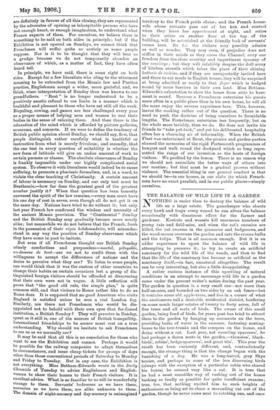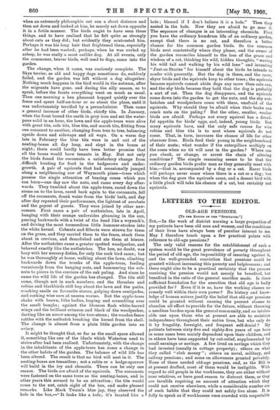THE BALANCE OF WILD LIFE IN A GARDEN.
NOTHING is easier than to destroy the balance of wild life on a large estate. The gamekeeper who shoots every hawk and traps every weasel he can alters the balance occasionally with disastrous effect for the farmer and gardener. Kestrels and weasels kill enormous numbers of young rats and field-mice, and when the rat's enemies are killed, the rat swarms in the granaries and hedgerows, and the wood-mouse overruns the garden and eats the crocus-bulbs and the tulips. That is all common enough. But it is an odder experience to upset the balance of wild life in attempting to preserve it; to try to create an artificial sanctuary for the wild life of the woods, and then to find that the life of the sanctuary has become as artificial as the sanctuary itself,—in fact, unnatural altogether. The result can be very interesting, but also a little disappointing.
A rather curious instance of this upsetting of natural conditions in an attempt to encourage wild life in a garden came under the present writer's notice during the past year. The garden in question is a very small one—not more than half-an-acre, and bounded on two sides by an oak fence—but it contains some old apple-trees, and lies in a corner of what the auctioneers call a desirable residential district, bordering on some much larger estates of twenty to forty acres, full of fine trees and all sorts of birds. The owner of this small garden, being fond of birds, for years past has tried to attract them to the garden by hanging up cocoanuts on the trees, providing baths of water in the summer, fastening nesting- boxes to the tree-trunks and the creepers on the house, and doing without a cat. Last year, not counting sparrows', he had perhaps a dozen nests in the garden,—thruslies', black- birds', robins', hedge-sparrows', and great tits'. This year the result has been curiously different, and, contradictorily enough, the strange thing is that the change began with the banishing of a dog. He was a long-haired, grey Skye terrier, and perhaps to some of the less discerning birds (always with the exception of a particular robin who shared his bones) he seemed very like a cat. It is true that he bad a most uncatlike way of rushing out of the house barking as loudly as possible for quite insufficient reasons ; true, too, that nothing excited him to such heights of enthusiasm as being set to chase a marauding cat out of the garden, though he never came near to catching one, and once when an extremely philosophic cat ran a short distance and then sat down and looked at him, he merely sat down opposite it in a futile manner. The birds ought to have seen these things, and to have realised that he felt quite as strongly about cats as they did; but evidently they mistrusted him. Perhaps it was his long hair that frightened them, especially after he had been washed; perhaps, when he was curled up asleep, be was really a most catlike dog. At all events, only the commoner, braver birds, well used to dogs, came into the garden.
The change, when it came, was curiously complete. The Skye terrier, as old and happy dogs sometimes do, suddenly failed, and the garden was left without a dog altogether. Nothing much happens in the bird world in the autumn, after the migrants have gone, and during the silly season, so to speak, before the frosts everything went on much as usual. Then one morning a hen pheasant hopped quietly over the fence and spent half-an-hour or so about the place, until it was unfortunately terrified by a perambulator. Then came a general increase of other birds, chiefly tits. In January, when the frost bound the earth in grey iron and set the water- pans solid in an hour, the lawn and the apple-trees were alive with great tits, cole tits, blue tits, and marsh tits, flitting from one cocoanut to another, changing from tree to tree, balancing upside down and sideways and all ways. On a warm day late in February the blue tits were in and out of the nesting-boxes all day long, and slept in the boxes at . night ; there could hardly have been better promise that all the boxes would have tenants in May. But not only .the birds found the cocoanuts a satisfactory change from , difficult hunting for food in the hedgerows and under- growth. A pair of squirrels that had occasionally jumped along a neighbouring row of Weymouth pines—trees which possess the single attraction of bearing cones which you can burn—one day saw the nuts, and came every day after- wards. They tumbled about the apple-trees, raced down the stems on to the lawn, raced back again to the cocoanuts, fell off the cocoanuts, drank water from the birds' bath, and day after day repeated their performance, the lightest of acrobats and the gayest of guests. They were joined by other new- comers. First came a pair of nuthatches, late in April, hanging with their orange undersides gleaming in the sun, peering backwards with a twist of the head like a wryneck's, and driving the most tremendous little hammer-strokes into the white kernel. Cobnuts and filberts were strewn for them on the grass, and they carried them to the fence, stuck them about in crevices, and demolished and ate them at leisure. After the nuthatches came a greater spotted woodpecker, and behaved exactly like the nuthatches. The hen, no doubt, was busy with her nursery duties, for only the cock bird came; but he was thoroughly at home, walking about the lawn, climbing backwards down the trunks of the apple-trees, feeding voraciously from the banging nuts, and hammering the cob- nuts to pieces in the crevices of the oak paling. And since he came the wild life of the garden has changed. The tits still come, though not in such numbers, and the thrushes and robins and blackbirds still hop about the lawn and the paths, cracking snails on favourite stones, gulping down centipedes, and cocking wise ears at unseen worms. But the apple-trees shake with brown, lithe bodies, leaping and scrambling over the small boughs ; against the blossom flash white-barred wings and the brilliant crimson and black of the woodpecker, darting like an arrow among the tree-stems ; the wooden fence rattles with the nuthatch breaking the kernel froth the shell. The change is almost from a plain little garden into an aviary.
It might be thought that, so far as the small space allowed it, something like one of the ideals which Waterton used to strive after had been realised. Unfortunately, with the change in the inhabitants of the apple-trees has come a change in the other habits of the garden. The balance of wild life has been altered. The result is that no bird will nest in it. The nesting-boxes are tenantless ; not a robin or a hedge-sparrow • will build in the ivy and clematis. There can be only one • reason. The birds are afraid of the squirrels. The cocoanuts ' were fastened on the same trees as the nesting-boxes, and in other years this seemed to be an attraction ; the tits would come to the nut, catch sight of the box, and make pleased remarks. • Like Mark Twain's blue jay, they observed the hole in the box,—" It looks like a hole; it's located like a
hole ; blamed if I don't believe it is a hole." Then they nested in the hole. Now they are afraid to go near it. The sequence of changes is an interesting chronicle. First you have the ordinary humdrum life of an ordinary garden, except that there is no cat, and. therefore a better chance for the common garden birds. So the common birds nest contentedly where they please, and the owner of the garden reconciles himself to the loss of the grace and wisdom of a cat, thinking his wild, hidden thoughts, "waving his wild tail and walking by his wild lone" and inventing "Just-so Stories" for himself about the birds be intends to confer with presently. But the dog is there, and the rarer, shyer birds and the squirrels keep to other trees ; the squirrels because squirrels cannot abide dogs any more than cats can, and the shy birds because they hold that the dog is probably a sort of cat. Then the dog disappears, and the squirrels come down into the garden to get the nuts, and the shy nut- hatches and woodpeckers come with them, unafraid of the squirrels. Why should they be afraid when their beaks can crack nuts on the paling ? But the other, smaller, weaker birds are afraid. Perhaps not every squirrel has a dread- ful appetite for birds' eggs, and, indeed, young birds. But many squirrels have, and the only safe course for wise robins and blue tits is to nest where squirrels do not come. That, in turn, increases the chance of life for other obscurer lives. Birds feed their young in the neighbourhood of their nests ; what wonder if the caterpillars multiply on the roses when no tit will nest in the garden ? Where can you check, or change, or arrest the chain of altering conditions ? The simple reasoning seems to be that the ordinary garden birds prefer man as they generally meet with him,—that is, accompanied by a dog or a cat. Rarer birds will perhaps never come where there is a cat or a dog ; but when the dog goes the squirrels come, and a decent bird with a little pluck will take his chance of a cat, but certainly not squirrels.







































 Previous page
Previous page